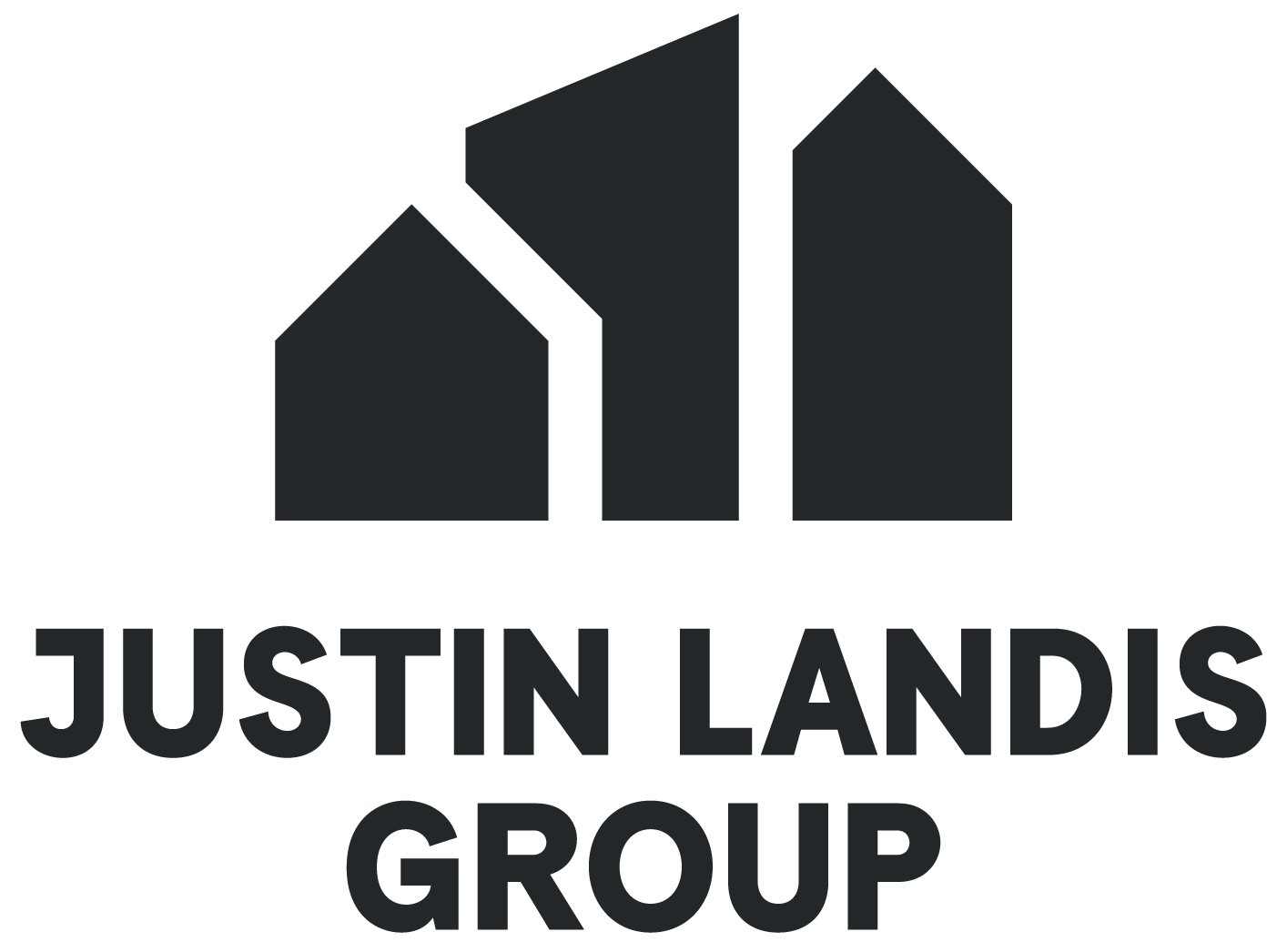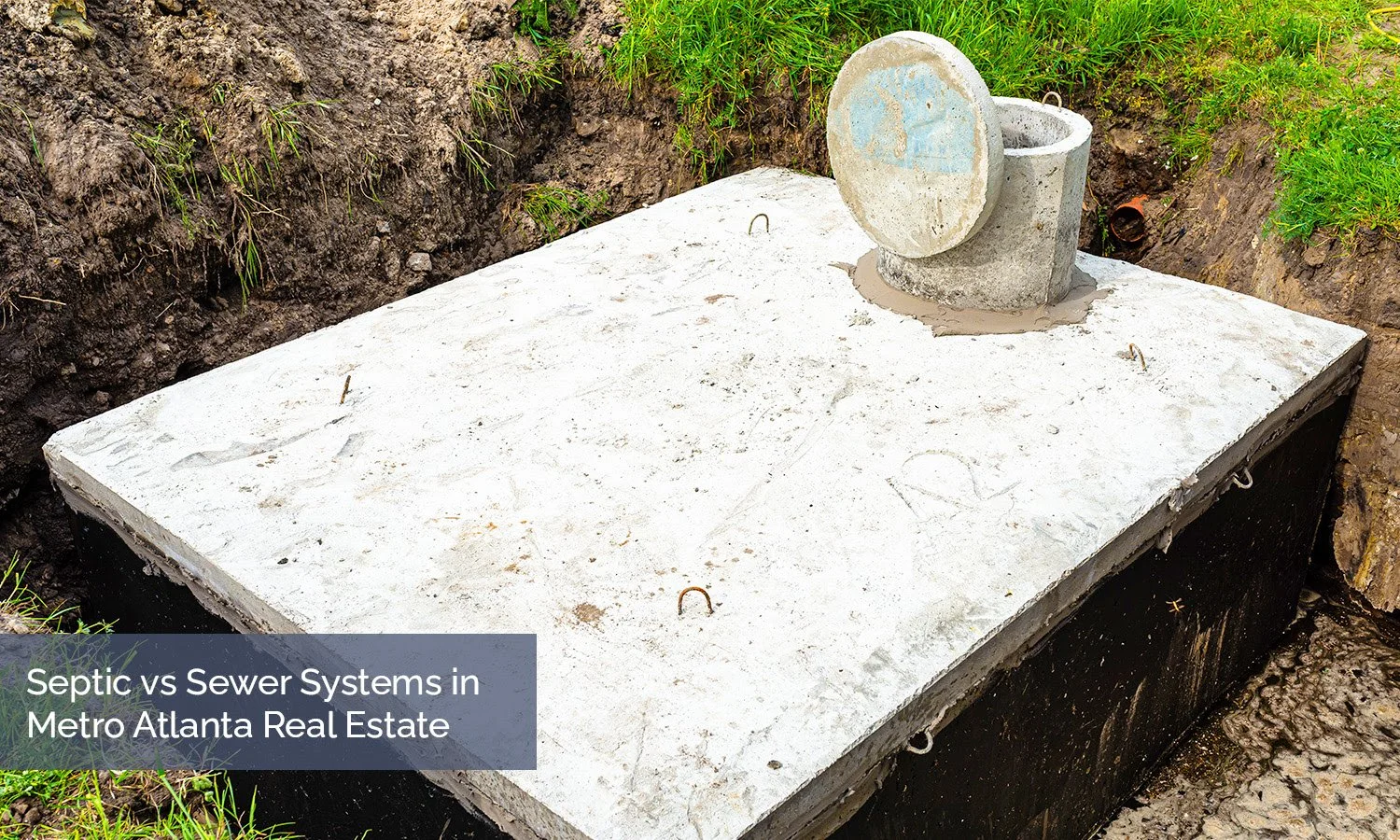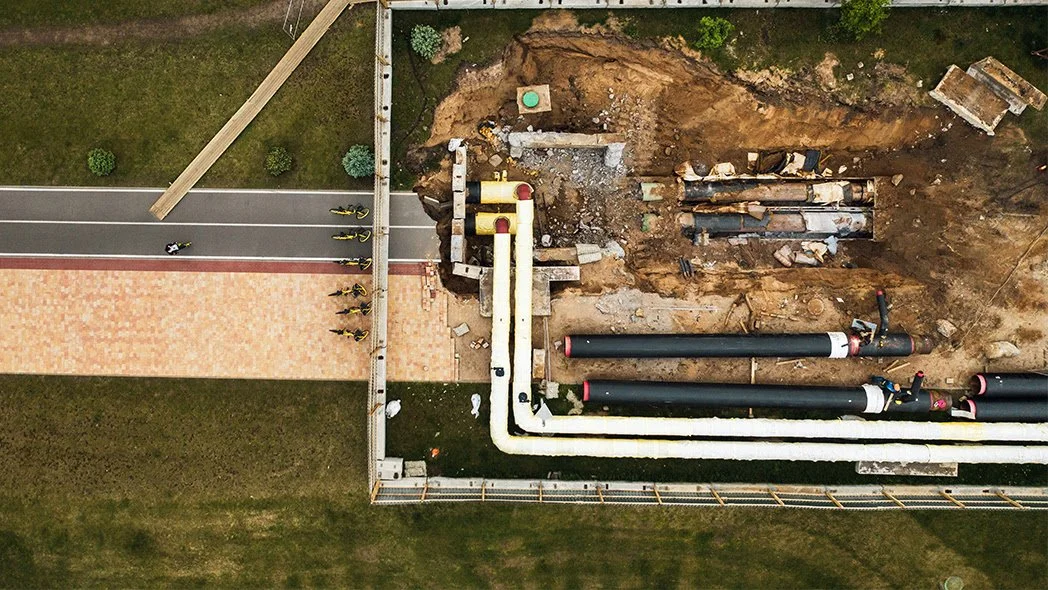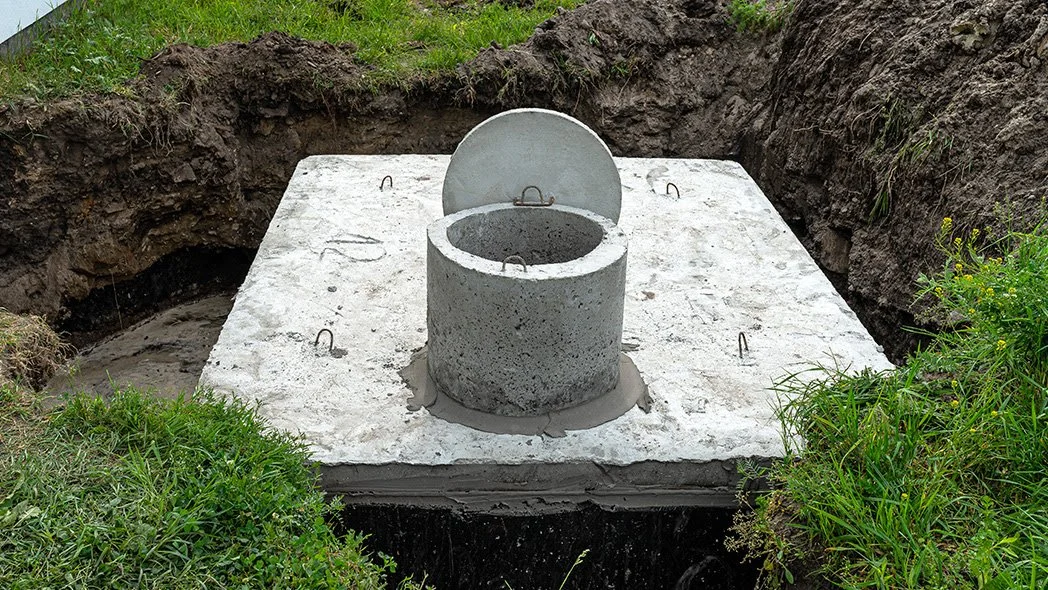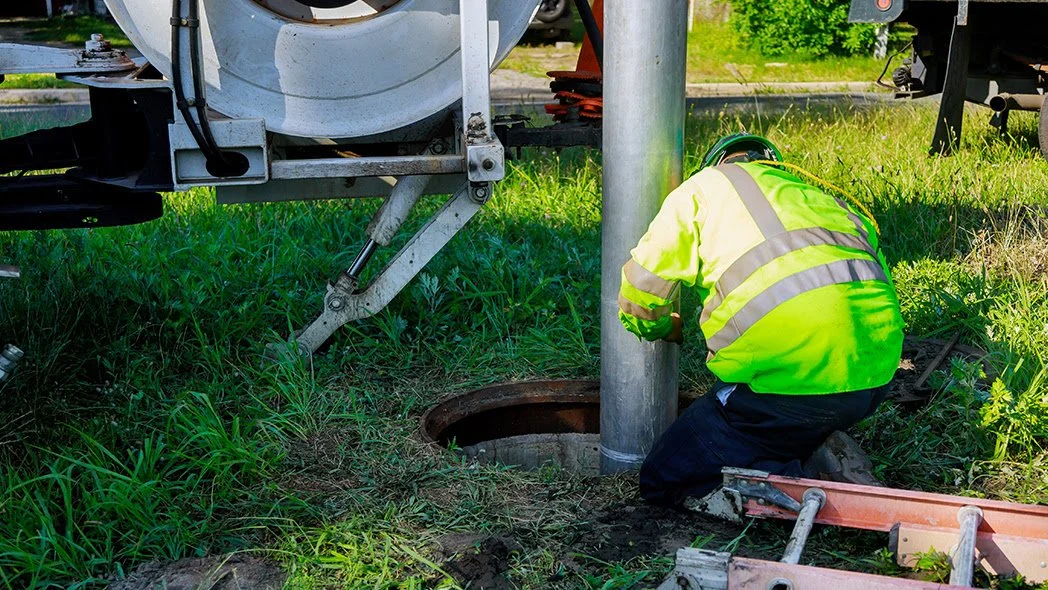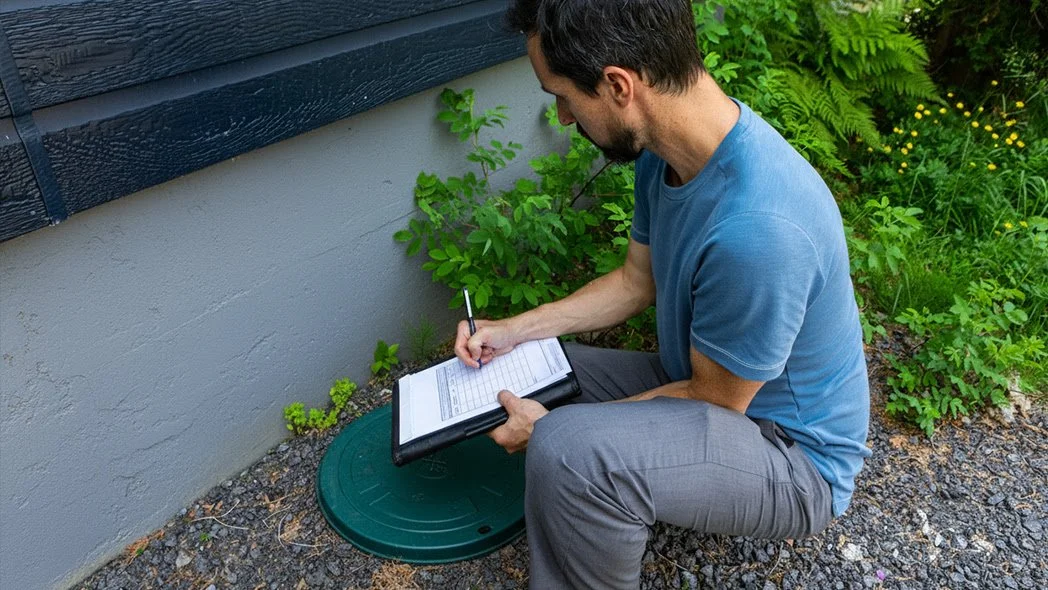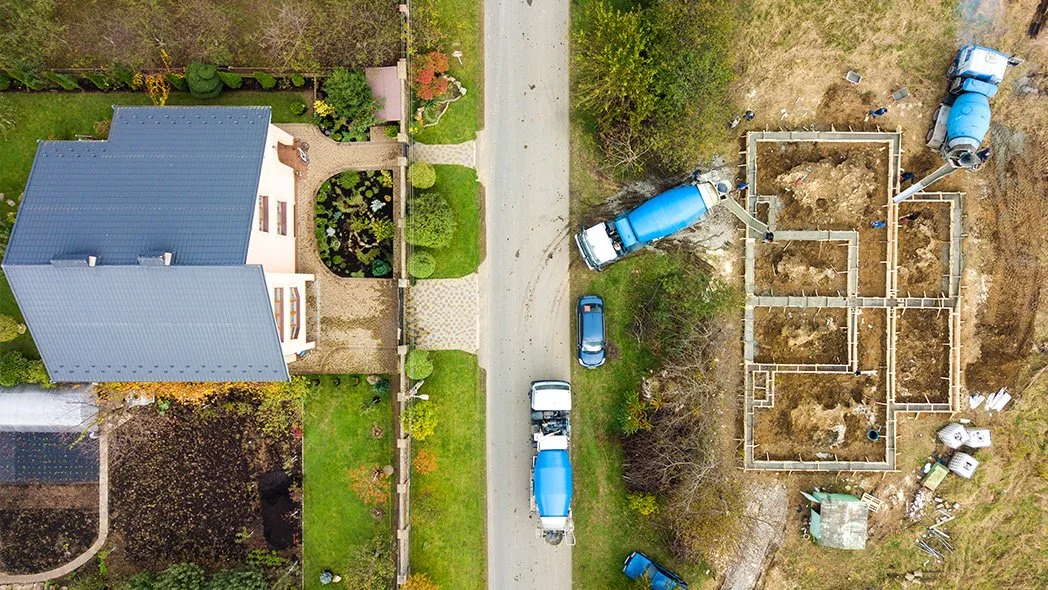Septic vs Sewer Systems in Metro Atlanta Real Estate
The search for a house in Metro Atlanta can get confusing pretty fast, especially when you discover that a beautiful Forsyth County property you've been looking at actually has a septic tank while a comparable home over in Roswell hooks right to the city sewer system. The price gap between these two properties comes from infrastructure differences that make much more sense when you look into them. Nearly 40% of Georgia homes still depend on septic systems. Atlanta has grown into this massive metropolitan area.
Sellers with septic systems face their own set of challenges when it comes time to list their property. And if you're comparing 2 different homes as a buyer, the monthly costs can vary wildly between them - figuring out why can be difficult.
Metro Atlanta has experienced very fast growth over the past few decades, and we've ended up with this mixed infrastructure situation. You'll find million-dollar estates out in Milton that still use septic tanks, and then you have these modest little homes inside I-285 that are connected to municipal sewer lines. Both types of systems have their own set of financial factors. And they affect property values and what you'll pay month-to-month as an owner. We should probably talk about what these infrastructure differences actually mean for anyone who buys or sells real estate throughout the region.
Let's find out which system is going to be the better fit for your Atlanta home search!
Metro Atlanta Has a Sewer System Divide
Metro Atlanta has an infrastructure quirk that most residents drive past every day without giving it much thought. The homes inside I-285 and those in the older suburban areas like Marietta and Roswell are almost all connected to the city sewer system. Drive out to Cherokee or Forsyth County, though, and suddenly it's a completely different story. Nearly every home in these areas relies on septic systems instead.
This division between sewer and septic actually makes sense once you understand the history. Atlanta expanded outward from its downtown core over a few decades, and the sewer lines followed that same expansion pattern. The established neighborhoods got the infrastructure first because it made financial sense to connect the dense areas where dozens of homes sat close together. Sewer lines are very expensive to install, so the cities prioritized areas where they'd serve the maximum number of homes per mile of pipe they laid down.
Past the perimeter, the economics just don't add up anymore. The properties are usually much bigger, and the neighborhoods are far more spread out than they are closer to the city. Georgia's famous red clay and granite bedrock make the situation even more difficult. The cost to blast through granite for sewer pipe installation can very quickly triple a normal construction budget, which explains why counties like Coweta and Cherokee still depend so heavily on septic systems even now.
The transition between these two systems creates some unusual patterns in some neighborhoods. The area around Lake Lanier in Forsyth County is a perfect example of this. Most of the original lakefront communities still have the same septic systems that were installed when these homes were built back in the 1970s. Newer developments just a mile or 2 away have full sewer access because the developers decided to pay the cost to extend the municipal lines. The result is this crazy patchwork where one street has the city sewer service and the very next street over has to use septic.
The same patchwork pattern shows up along the edges of all the established suburbs around Atlanta. East Cobb has sewer service in most areas, but a 10-minute drive north puts you squarely in septic territory.
How Septic Systems Affect Your Property Value
Metro Atlanta has an interesting real estate quirk that not everyone knows about - the septic homes usually sell for less money than houses with sewer connections. We're talking about 5% to 10% less on average. If you actually sit down and look at the sales numbers from the past few years, that percentage turns into quite a bit of money that sellers are leaving on the table.
North Fulton subdivisions show this pricing pattern all the time. Sometimes you'll see 2 houses with the exact same floor plan built by the same builder with matching finishes and upgrades. Everything about them is identical except for 1 big detail - 1 house has septic while the other connects to the municipal sewer system. That septic home will routinely sell for $30,000 less and sometimes even more than that. Most buyers are willing to pay extra money just so they don't have to worry about septic systems at all.
Personal preference is part of the story here. Insurance companies usually treat septic properties differently and not in a positive way. The higher premiums happen pretty frequently, and plenty of insurers want extra inspections done before they'll even write a policy. Lenders can be just as particular about septic homes. A lot of them want a full septic inspection as part of the loan approval process, and some actually cap their loan amounts lower for septic properties than they would for comparable sewer homes. You're working with a smaller group of buyers who might buy your home right from the start, before your house even hits the market. These obstacles exist.
Home search websites make this problem even worse. Almost every big real estate platform has a filter that lets buyers exclude septic properties with a single click. Thousands of buyers use that filter automatically, and they never even see what your house has to show them since they checked that box. Your perfect buyer could be out there looking for just what you're selling, but they'll never know your house exists because they checked 1 little box on a search form.
Septic systems don't hurt property values in every market, though. Milton's luxury estate market is a perfect example of where this pattern doesn't apply. Multi-million-dollar properties on 5 or 10 acres hold their value just fine with septic systems. That's because buyers shopping for estate homes already know what they're signing up for. When you're buying that much land and privacy, it's obvious that municipal sewer lines aren't going to reach your property, and you're okay with that trade-off.
Transitional neighborhoods see the biggest price gaps between septic and sewer homes. I'm talking about areas where 1 street has sewer access while the next street over is still on septic. When buyers can directly compare 2 similar houses and 1 has sewer while the other doesn't, they will usually pay more for the sewer connection. It's an easy choice for them when the comparison is that straightforward.
What You Pay for Septic Maintenance
The price tag on a Metro Atlanta home is actually just the beginning of what you'll wind up paying each month. Then again, septic maintenance has its own price tag as well. A standard septic tank needs to be pumped out once every 3 to 5 years, and each pumping session costs anywhere from $300 to $500. Even worse - you're looking at replacement costs that run from $8,000 to $20,000 if there's a total system failure.
Metro Atlanta has its own set of complications for anyone with a septic system on their property. The heavy clay soil throughout our region just won't absorb and drain water very well, unlike the sandy soil you'd find in other parts of the country. Combine that clay with Georgia's seasonal rainfall patterns, and your septic system ends up wearing out much faster than it should. The tank has to work overtime compared to what the same system would face in a drier climate with soil that drains properly.
Beyond the big maintenance costs, there's a whole bunch of everyday inconveniences that add up over time. Special septic-safe toilet paper turns into a normal grocery expense because the standard types won't break down fast enough for the system. That nice garbage disposal in your kitchen? It might as well be a decoration since you can't use it without risking an overload to the septic tank. Holiday gatherings become a logistical challenge because the system just can't manage the water load when multiple guests need to shower back-to-back in the morning.
A few of the more established neighborhoods around Metro Atlanta have actually started the conversion process to municipal sewer lines recently. The homeowners in these transitioning areas usually get hit with special assessment fees that range from $15,000 to $30,000 just for the connection alone. The expense is really big - no question about it. Plenty of residents happily write that check anyway after years of the never-ending septic system anxiety and maintenance troubles, since the reliability of a municipal sewer connection seems like money well spent.
Problems That End Real Estate Deals
Inspection standards have actually shifted in the last couple of years, and it's made a real difference in what passes and what doesn't. North Fulton County recently overhauled its laws, and now its inspectors are finding problems that would have gone unnoticed just a few years ago. A septic system that sailed through inspection back in 2019 might fail the exact same inspection if it were done today.
When an inspector arrives at a property, they're going to be on the lookout for a few common problems that show up on Georgia properties again and again. One of the first red flags is water that sits on top of the drain field instead of absorbing into the soil below. Tree roots are another massive headache - our native oak and pine trees grow very aggressively in this climate, and their roots tend to work their way into septic lines wherever they can find an opening. And of course, there's the tank itself to worry about. Some homeowners go 10, 15 or 20 years without ever pumping their tank, and this long-term neglect shows up quickly during an inspection.
For sellers, timing can be particularly brutal when these problems come to light. Just when the buyer is ready to sign on the dotted line, a failed inspection can send the whole deal sideways, and suddenly everyone's trying to figure out how to move forward.
Buyers who know what they're doing will always ask for the right documentation before they sign anything. At a bare minimum, they'll want to see pumping records that go back at least 5 years, because those records paint a detailed picture of how well the previous owner actually maintained the system. A well-maintained septic system should be pumped every 3 to 5 years, though the exact timing depends on the number of residents in the house and how much water they use.
Once that inspection report comes back, it gives the buyers some leverage during negotiations. If the big parts have failed or need replacement, the sellers are left with 2 options: either pay to fix everything before closing or adjust their asking price to account for the repairs that the buyers are going to need to take care of.
Smart Choices That Work for Everyone
The age of the system matters when buyers put together an offer. Cherokee County's clay soil is very tough on septic systems, and if one has been sitting in that ground for 20 years, it's probably not going to make it another 5 without major work. Buyers who know what they're doing factor the replacement cost into their first offer instead of hoping for the best.
Credits from the seller are always worth requesting for older systems. Lots of buyers also ask for home warranties with septic coverage included. Sellers usually prefer to write a check for the credits rather than schedule repairs when they're already packing boxes and arranging movers.
East Cobb has become particularly interesting for buyers and sellers lately. Municipal sewer lines are finally reaching the neighborhoods that have always relied on septic, and now buyers in these areas sometimes make their offers contingent on the seller connecting to the new sewer. Yes, it's expensive - very expensive actually. But for the right buyer at the right price, sellers usually agree to it.
The economics of it work differently for different parties. Some buyers will happily take a septic system if the home price accounts for it. Other buyers will pay a premium just to have municipal sewer and never have to worry about pumping schedules or drain field maintenance. Both ways make sense depending on what matters to you and what you're comfortable with maintaining.
Of course, lots of buyers specifically search for septic properties because these homes usually have bigger lots. More land means more distance from the neighbors and more room for the kids to play, and just more breathing room all around. For these buyers, septic maintenance every now and then is a small price to pay for that extra privacy and space.
Moving to Atlanta?
Once you've looked at homes across Metro Atlanta for a while, you'll eventually realize that the infrastructure debate has nothing to do with which system wins some imaginary competition. It's actually just a matter of what makes sense for the life you want to live. Some families love the control and independence that septic systems give them. Other people want the simplicity of municipal sewer connections where the city takes care of everything. These two approaches have been working just fine for Atlanta homeowners for decades now, and that's not going to change anytime soon as our neighborhoods continue to evolve and expand.
The interesting part about this whole situation is how Atlanta keeps pushing its boundaries into the land that was nothing but farms and forests when our parents were kids. Every infrastructure choice that's happening right now is really creating the blueprint for how the next generation will experience this entire region. A house that's built now with a septic system might keep that setup for the next 50 years, or the county could run sewer lines through in just 10 years when enough neighbors move in to justify the cost. At the same time, those established neighborhoods that already have sewer access are watching their property values steadily increase because buyers see the value of that convenience.
The most sensible strategy for any buyer is to be ready for either scenario when house hunting. Or maybe you'll add a monthly sewer bill to your budget - so you can base your choice on concrete information instead of assumptions or worry.
Atlanta's neighborhoods are all so different from one another, and each one has its own character and feel that sets it apart from the rest. Some parts of it are quiet and suburban with big yards and tree-lined streets. Others are right in the middle of everything with restaurants and shops within walking distance. The market can be a lot to take in if you don't know where to start or which neighborhoods match what you want.
The Justin Landis Group has been helping families find their way through Atlanta's real estate for years, and we know these communities better than just about anyone. Our team will show you around and help you narrow down your options based on your lifestyle and what matters to you. Contact us and we'll help you find the perfect neighborhood for your next home.
